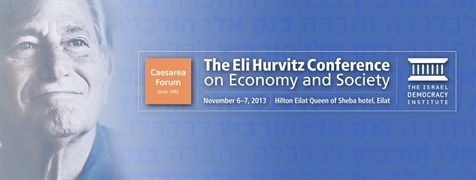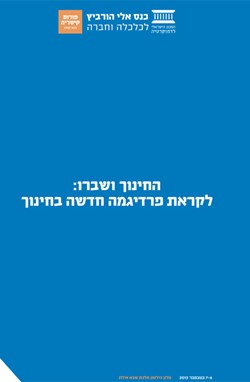Toward a New Paradigm in Israeli Education
A Publication of the 2013 Eli Hurvitz Conference on Economy and Society
- Written By: Dan Inbar, Amnon Karmon, Varda Shiffer, Dirk Van Damme
- Publication Date:
- Center: Eli Hurvitz Conference on Economy and Society

On November 6–7, 2013, IDI will convene the second Eli Hurvitz Conference on Economy and Society. Formerly known as the Caesarea Economic Policy Planning Forum, the conference fosters open discussion between senior government decision-makers and leading figures in academia, the non-profit sector, and the business world. The event will be broadcast live on the IDI website in both Hebrew and English.
This booklet of recommendations, which is available in full in both Hebrew and English, was prepared in advance of the conference by a working group of researchers who explored issues related to education.
In recent decades, deep fault lines have developed between schools and the social environment in which they operate. The school's activity in its current format is not only dysfunctional but also harmful from important educational and social perspectives. At the heart of the tensions between the school and the society are the teachers, who draw fire from all directions: the pupils, the parents, the school principal, the Ministry of Education and the general public.
In light of this, we propose that the 2013 Eli Hurvitz Conference on Economy and Society serve as a starting point and catalyst for a process of strategic thinking about alternative paradigms for the school – worthy and feasible paradigms for the Israeli reality in the early 21st century. We propose using these paradigms to derive practical recommendations for teacher-related policies: the comprehensive array of training processes, professional development, accreditation and employment of teachers in the education system.
In preparation for the Conference, and based on the activities carried out over the last three years at the Van Leer Jerusalem Institute, we hereby present two position papers.
The first position paper analyzes five fractures or "fault lines" that have emerged in recent decades between the school and society and the questions they raise as well as the educational damage inherent in them. This is followed by a description of the problems these rifts create for the community of teachers. The problems created by the growing rift between the school and society are different from regular problems in education for two main reasons: the first is that understanding and confronting them requires a broader perspective that transcends the field of education. A discussion that remains within the bounds of education will not suffice; a more extensive look at the totality of social phenomena is required. Second, the fault lines create a structural mismatch between the elements on either side that require significant movement to mend them. First-order changes are not enough; second-order changes are necessary.
The second position paper outlines a collaborative and gradual process of deliberations aimed at clarifying and defining the roles, powers, and responsibilities associated with the management of the teaching workforce and redistributing these roles, powers, and responsibilities between the central government (primarily the Ministry of Education) and the local authorities in a well-thought-out and mutually acceptable fashion. The outline for discussion will generate the readiness and commitment necessary for the success of the process, and will boost the trust among all stakeholders in the field of education.
This is a process aimed at development of a supportive team of teachers who are committed to all of the pupils in the community, a work environment that encourages creativity, partnership, and trust—which are prerequisites for enhancing the teaching and learning processes and of the education system in general. The goal is to weaken the strong and longstanding correlation between socioeconomic status and educational achievement. In other words, the goal is do away with the intolerable gaps in educational services between the center of the country and the geographic and social periphery, once and for all.
Head
- Prof. Dan Inbar, Chair, Education Department, The Van Leer Jerusalem Institute
Members
- Dr. Amnon Karmon, Research Fellow, Education Department, The Van Leer Jerusalem Institute; Author of position paper: “Teacher Policy along a Pedagogical Fault Line”
- Dr. Varda Shiffer, Research Fellow, Education Department, The Van Leer Jerusalem Institute; Author of position paper: “Restructuring Educational Human Resource Management in the Israeli Education System”
- Prof. Shlomit Amichai, Chairperson, Teach First Israel, JDC-Israel
- Prof. Tamar Ariav, President, Beit Berl College and Chair, RAMA (Council of Education Colleges)
- Mr. Ido Avgar, Junior Researcher, Education Department, The Van Leer Jerusalem Institute
- Prof. Michal Beller, Director-General of RAMA: National Authority for Measurement and Evaluation in Education
- Ms. Yael Guron, Principal of Hartuv High School, literature and citizenship teacher; Fellow, Mandel School for Educational Leadership
- Ms. Nurit Herman-Almoznino, Director, Education Department, The Van Leer Jerusalem Institute
- Mr. Avi Kaminsky, Director of Educational Division, Municipality of Rosh Ha'ayin; Chairman, Israel Union of Education Directors in Local Municipalities
- Ms. Ravit Mizrahi Shtelman, Junior Researcher, Education Department, The Van Leer Jerusalem Institute
- Ms. Amira Perlov, Principal of Experimental-Integrative School, Kfar-Adumim
- Ms. Naomi Riftin, Chair, Pedagogical Secretariat, Israel Teachers Union
- Mr. Noam Zussman, Economist, Research Department, Bank of Israel

